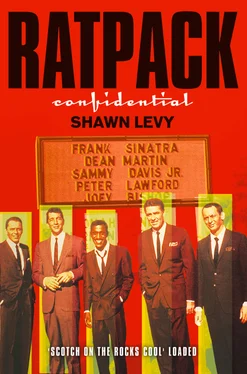It didn’t take long for him to regret his words. “That was it for Sammy,” Peter remembered. “Frank called him ‘a dirty nigger bastard’ and wrote him out of Never So Few.” The part went to Steve McQueen—one of his first important roles. Sammy, who was nearing $300,000 of debt, certainly regretted losing the work, but he was far more concerned with the way Frank had written him off.
“You wanna talk destroyed?” said Lawford’s manager, Milt Ebbins. “Sammy Davis cried from morning to night. He came to see us when Peter was at the Copacabana, appearing with Jimmy Durante. He said, ‘I can’t get Frank on the phone. Can’t you guys do something?’ Peter told him, ‘I talked to Frank but he won’t budge.’ ”
Sammy was banished from Frank’s very presence. “For the next two months Sammy was on his knees begging for Frank’s forgiveness,” Lawford recalled, “but Frank wouldn’t speak to him. Even when they were in Florida together and Frank was appearing at the Fontainebleau and Sammy was next door at the Eden Roc, Frank still refused to speak to him.” (He wouldn’t even be in the same building with him; he had Sammy banned from his shows and wouldn’t go next door to watch him perform.)
But there must have been some sort of bond there, because Frank relented, even when he had nothing in particular to gain from it. “Frank let him grovel for a while,” Peter said, “and then allowed him to apologize in public a couple of months later.”
The reconciliation went as far as new offers of work. Frank was assembling the cast of Ocean’s Eleven. He would let Sammy back in the fold in time to take a role in the movie, but one with a bit of a sting to it: For no obvious reason other than petty spite, Sammy was cast as a singing, dancing garbageman.
Sammy was nevertheless overwhelmed to be asked aboard because Ocean’s Eleven had begun to take shape as something more than just a movie. Frank decided that he would film it at his place, the Sands, and fill it with chums—everybody from Dean and Sammy and Peter to vibraphonist Red Norvo and actor buddies like Henry Silva and Richard Conte.
As a bonus, there’d be a freewheeling live show in the Copa Room each night featuring the actors. For that, Frank realized, he’d need a traffic cop, somebody who fit in with the A-list names but with the nightclub experience to get guys on and off the stage and who wouldn’t embarrass himself in front of the movie camera.
He had just the guy in mind: Joey Bishop.
Frank called him “the Hub of the Big Wheel” and preferred him to almost every other stand-up comic. He addressed the world with a stiff-shouldered, side-of-the-mouth delivery that was as much jab as shrug, a deft emcee who knew how to keep the show moving and not draw attention from the stuff the people really came to see.
But nevertheless, to most observers it was the Big Mystery of the Rat Pack: What was Joey Bishop doing up there?
Frank, Dean, and Sammy were clearly peas from the same pod, and Peter was a guy who swung like them and provided entrée to the Kennedys.
Joey, however, had neither powerful relatives nor a reputation as a roué, and as performer he was plainly one-dimensional: He acted about as well as Sammy, sang about as well as Peter, danced about as well as Dean.
But he had an air about him—the world-weary little guy with the plucky, jaded attitude—that appealed to Frank, who indirectly sponsored his career from the early fifties on. Other comics would try to win an audience with dazzling wit or class clown antics. Joey went the other way, wearing a stage face that suggested he found the idea of entertaining the crowd slightly undignified. It was largely a matter of style—“My technique is to be overheard rather than heard,” he liked to say—but there was temperament there as well.
“My cynicism is based upon myself,” he told a reporter in a self-analytic moment. “I don’t tell audiences to be cynical. I just bring them down to reality. I feel that when you try to cheer somebody up, you probably have a guilt complex. When a child sulks, eventually you ask him what’s wrong because you probably feel you’re the reason he’s sulking.”
He should’ve known. For a guy best known as a chum among chums, he could be taciturn, moody, aloof, exclusive. Even when he was among the honored guests at the Party of Parties, he kept to himself. “I was always a go-homer,” he admitted. “When we were doing the Summit Meeting shows in Vegas, the other guys would stay up until all hours, but I went to bed. I may rub elbows, but I don’t raise them.”
In fact, he gave off an almost perverse aura, as if he resented his own success and the hand his padrone , Frank, had in it. “I met Frank in 1951,” he said, “and, sure, he’s helped me a lot. We’ve worked together many times, and I enjoy it, but we don’t socialize afterwards.” And he didn’t care if he pissed him off. During the Summit, Frank was feuding with a Vegas club owner and declared the guy’s joint officially off limits; Joey, the story went, went anyhow.
His independence was his trademark, his currency, and he gambled that Frank would read it not as insolence but rather a sign of maturity and maleness. It almost backfired. “I have always respected Frank’s moods,” Joey recalled. “I have never walked over to Frank when he’s having dinner with someone and just sat down uninvited. Which, I think, was another reason why he chose to have me with him. Then it got to the point where he would say to me, ‘What’s the matter, Charlie? You’re getting stuck up?’ ”
It was a fine line that he braved. Reporters who got close to him during the Rat Pack era seemed genuinely to like him, but few of them depicted him as, in the cliché of the showbiz puff piece, rough on the outside but sweet at heart. “You can pretend to be happy if you want to,” he told one; “I’m a worrier by nature,” he confessed to another. “No worrier is ever good-humored. I don’t know if a worrier ever is happy.”
Of all the moons in Frank’s orbit, only Dean had anything like Joey’s need for independence. They were the only ones who ever seemed willing to do without Frank’s blessing—or even to outright defy him. Maybe it was because they had a few things in common. Unlike Sammy, Frank, and Peter, they’d grown up with siblings and stable homes, and their career successes came relatively late in their lives. Dean was thirty when he broke through with Jerry Lewis; Joey was nearly forty when the public and the business started taking real notice of him.
He’d had a few brushes with the big time, and their failure to materialize seemed to cauterize him against the world all the more: “Once, when I was sharing a bill with Frank at the Copacabana, the audience kept me going 28 minutes overtime almost every night,” he told a reporter. “Frank kept telling me, ‘You’re solid now—you’re on your way’ Know what happened? I didn’t work for six weeks.”
It was the kind of mixed success his career had accustomed him to. He’d been trying to make it big for more than twenty years when he was picked by Frank for the cast of Ocean’s Eleven. Prior to that, he’d glimpsed the top frequently enough to develop a sardonic attitude about not ever having reached it. He was a plugger, and he knew it: “I’m a slow starter. There can never be a big, hitting thing with me … I don’t have the type of personality that shatters you right off. I have to work at being funny. The work is hard. I’m hard sometimes.” That way he had of dismissing things, deflating things—it came naturally to a guy who’d had to fight for everything and even then didn’t quite get it.
He was born in the Bronx in 1918, the fifth and last child of Jacob Gottlieb, a machinist and bike repairman, and his wife, Anna. He was sickly—the littlest baby, he used to brag, ever born in Fordham Hospital (he told the story to an incredulous Buddy Hackett, who responded with a look of concern, “Did you live?”). At three months, the family moved to Philadelphia, where the slight baby grew into a slight child.
Читать дальше












